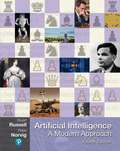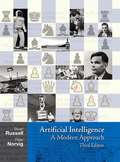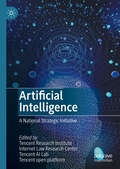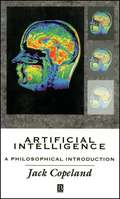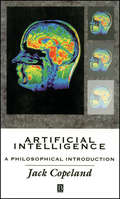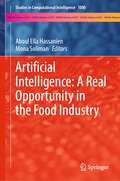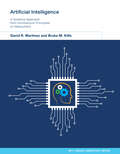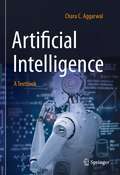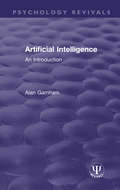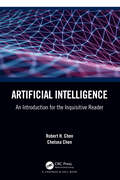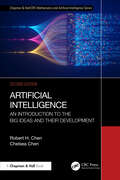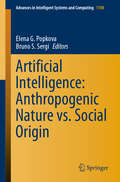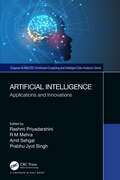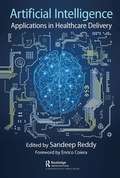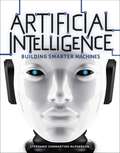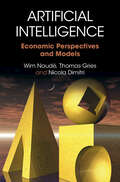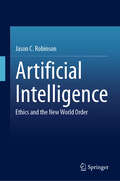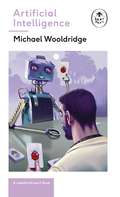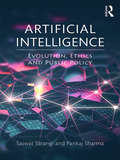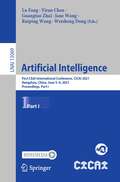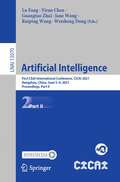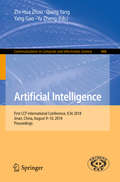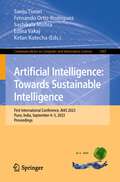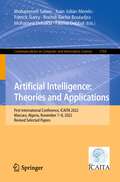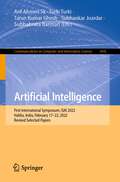- Table View
- List View
Artificial Intelligence: A Modern Approach
by Stuart Russell Peter NorvigArtificial Intelligence: A Modern Approach (AIMA) is a university textbook on artificial intelligence, written by Stuart J. Russell and Peter Norvig. It was first published in 1995 and the fourth edition of the book was released 28 April 2020. It is used in over 1400 universities worldwide and has been called "the most popular artificial intelligence textbook in the world". It is considered the standard text in the field of artificial intelligence. The book is intended for an undergraduate audience but can also be used for graduate-level studies with the suggestion of adding some of the primary sources listed in the extensive bibliography.
Artificial Intelligence: A Modern Approach, Third Edition
by Peter Norvig Stuart J. RussellThis third edition of Artificial Intelligence: A Modern Approach offers the most comprehensive, up-to-date introduction to the theory and practice of artificial intelligence. This textbook is useful for one or two-semester, undergraduate or graduate-level courses in Artificial Intelligence.
Artificial Intelligence: A National Strategic Initiative
by Tencent Research Institute Caict Tencent Ai Lab Tencent Open PlatformThis book begins with the past and present of the subversive technology of artificial intelligence, clearly analyzes the overall picture, latest developments and development trends of the artificial intelligence industry, and conducts in-depth research on the competitive situation of various countries. The book also provides an in-depth analysis of the opportunities and challenges that artificial intelligence brings to individuals, businesses, and society. For readers who want to fully understand artificial intelligence, this book provides an important reference and is a must-read.
Artificial Intelligence: A Philosophical Introduction
by Jack CopelandPresupposing no familiarity with the technical concepts of either philosophy or computing, this clear introduction reviews the progress made in AI since the inception of the field in 1956. Copeland goes on to analyze what those working in AI must achieve before they can claim to have built a thinking machine and appraises their prospects of succeeding. There are clear introductions to connectionism and to the language of thought hypothesis which weave together material from philosophy, artificial intelligence and neuroscience. John Searle's attacks on AI and cognitive science are countered and close attention is given to foundational issues, including the nature of computation, Turing Machines, the Church-Turing Thesis and the difference between classical symbol processing and parallel distributed processing. The book also explores the possibility of machines having free will and consciousness and concludes with a discussion of in what sense the human brain may be a computer.
Artificial Intelligence: A Philosophical Introduction
by Jack CopelandPresupposing no familiarity with the technical concepts of either philosophy or computing, this clear introduction reviews the progress made in AI since the inception of the field in 1956. Copeland goes on to analyze what those working in AI must achieve before they can claim to have built a thinking machine and appraises their prospects of succeeding. There are clear introductions to connectionism and to the language of thought hypothesis which weave together material from philosophy, artificial intelligence and neuroscience. John Searle's attacks on AI and cognitive science are countered and close attention is given to foundational issues, including the nature of computation, Turing Machines, the Church-Turing Thesis and the difference between classical symbol processing and parallel distributed processing. The book also explores the possibility of machines having free will and consciousness and concludes with a discussion of in what sense the human brain may be a computer.
Artificial Intelligence: A Real Opportunity in the Food Industry (Studies in Computational Intelligence #1000)
by Aboul Ella Hassanien Mona SolimanThis book emphasizes the latest developments and achievements in AI and related technologies with a special focus on food quality. The book describes the applications, and conceptualization of ideas, and critical surveys covering most aspects of AI for food quality.
Artificial Intelligence: A Systems Approach from Architecture Principles to Deployment (MIT Lincoln Laboratory Series)
by David R. Martinez Bruke M. KifleThe first text to take a systems engineering approach to artificial intelligence (AI), from architecture principles to the development and deployment of AI capabilities.Most books on artificial intelligence (AI) focus on a single functional building block, such as machine learning or human-machine teaming. Artificial Intelligence takes a more holistic approach, addressing AI from the view of systems engineering. The book centers on the people-process-technology triad that is critical to successful development of AI products and services. Development starts with an AI design, based on the AI system architecture, and culminates with successful deployment of the AI capabilities. Directed toward AI developers and operational users, this accessibly written volume of the MIT Lincoln Laboratory Series can also serve as a text for undergraduate seniors and graduate-level students and as a reference book. Key features:In-depth look at modern computing technologies Systems engineering description and means to successfully undertake an AI product or service development through deploymentExisting methods for applying machine learning operations (MLOps)AI system architecture including a description of each of the AI pipeline building blocksChallenges and approaches to attend to responsible AI in practice Tools to develop a strategic roadmap and techniques to foster an innovative team environment Multiple use cases that stem from the authors&’ MIT classes, as well as from AI practitioners, AI project managers, early-career AI team leaders, technical executives, and entrepreneurs Exercises and Jupyter notebook examples
Artificial Intelligence: A Textbook
by Charu C. AggarwalThis textbook covers the broader field of artificial intelligence. The chapters for this textbook span within three categories:Deductive reasoning methods: These methods start with pre-defined hypotheses and reason with them in order to arrive at logically sound conclusions. The underlying methods include search and logic-based methods. These methods are discussed in Chapters 1through 5.Inductive Learning Methods: These methods start with examples and use statistical methods in order to arrive at hypotheses. Examples include regression modeling, support vector machines, neural networks, reinforcement learning, unsupervised learning, and probabilistic graphical models. These methods are discussed in Chapters~6 through 11. Integrating Reasoning and Learning: Chapters~11 and 12 discuss techniques for integrating reasoning and learning. Examples include the use of knowledge graphs and neuro-symbolic artificial intelligence.The primary audience for this textbook are professors and advanced-level students in computer science. It is also possible to use this textbook for the mathematics requirements for an undergraduate data science course. Professionals working in this related field many also find this textbook useful as a reference.
Artificial Intelligence: An Introduction (Psychology Revivals)
by Alan GarnhamFirst published in 1987, this book provides a stimulating introduction to artificial intelligence (AI) - the science of thinking machines. After a general introduction to AI, including its history, tools, research methods, and its relation to psychology, Garnham gives an account of AI research in five major areas: knowledge representation, vision, thinking and reasoning, language, and learning. He then describes the more important applications of AI and discusses the broader philosophical issues raised by the possibility of thinking machines. In the final chapter, he speculates about future research in AI, and more generally in cognitive science. Suitable for psychology students, the book also provides useful background reading for courses on vision, thinking and reasoning, language and learning.
Artificial Intelligence: An Introduction for the Inquisitive Reader
by Robert H. Chen Chelsea C. ChenArtificial Intelligence: An Introduction for the Inquisitive Reader guides readers through the history and development of AI, from its early mathematical beginnings through to the exciting possibilities of its potential future applications. To make this journey as accessible as possible, the authors build their narrative around accounts of some of the more popular and well-known demonstrations of artificial intelligence including Deep Blue, AlphaGo and even Texas Hold’em, followed by their historical background, so that AI can be seen as a natural development of mathematics and computer science. As the book moves forward, more technical descriptions are presented at a pace that should be suitable for all levels of readers, gradually building a broad and reasonably deep understanding and appreciation for the basic mathematics, physics, and computer science that is rapidly developing artificial intelligence as it is today. Features Only mathematical prerequisite is an elementary knowledge of calculus Accessible to anyone with an interest in AI and its mathematics and computer science Suitable as a supplementary reading for a course in AI or the History of Mathematics and Computer Science in regard to artificial intelligence.
Artificial Intelligence: An Introduction to the Big Ideas and their Development (Chapman & Hall/CRC Mathematics and Artificial Intelligence Series)
by Robert H. Chen Chelsea ChenArtificial Intelligence: An Introduction to Big Ideas and their Development, Second Edition guides readers through the history and development of artificial intelligence (AI), from its early mathematical beginnings through to the exciting possibilities of its potential future applications. To make this journey as accessible as possible, the authors build their narrative around accounts of some of the more popular and well-known demonstrations of artificial intelligence, including Deep Blue, AlphaGo and even Texas Hold’em, followed by their historical background, so that AI can be seen as a natural development of the mathematics and computer science of AI. As the book proceeds, more technical descriptions are presented at a pace that should be suitable for all levels of readers, gradually building a broad and reasonably deep understanding and appreciation for the basic mathematics, physics, and computer science that is rapidly developing artificial intelligence as it is today. Features Only mathematical prerequisite is an elementary knowledge of calculus. Accessible to anyone with an interest in AI and its mathematics and computer science. Suitable as a supplementary reading for a course in AI or the History of Mathematics and Computer Science in regard to artificial intelligence. New to the Second Edition Fully revised and corrected throughout to bring the material up-to-date. Greater technical detail and exploration of basic mathematical concepts, while retaining the simplicity of explanation of the first edition. Entirely new chapters on large language models (LLMs), ChatGPT, and quantum computing.
Artificial Intelligence: Anthropogenic Nature vs. Social Origin (Advances in Intelligent Systems and Computing #1100)
by Elena G. Popkova Bruno S. SergiThis book presents advanced research studies on the topic of artificial intelligence as a component of social and economic relations and processes. It gathers research papers from the International Research-to-Practice Conference “The 21st Century from the Positions of Modern Science: Intellectual, Digital and Innovative Aspects” (May 23–24, 2019, Nizhny Novgorod, Russia) and the International Research-to-Practice Conference “Economics of Pleasure: a Science of Enjoying Economic Activities” (October 3–5, 2019, Prague, Czech Republic). Both conferences were organized by the Autonomous Non-Profit Organization “Institute of Scientific Communications” (Volgograd). What sets this book apart from other publications on the topic of artificial intelligence is that it approaches AI not as a technological tool, but as an economic entity. Bringing together papers by representatives of various fields of social and human knowledge, it systematically reflects on various economic, social, and legal aspects of the creation, application, and development of artificial intelligence. Given the multidisciplinary nature of its content, the book will appeal to a broad target audience, including those engaged in developing AI (scientific research institutes and universities), and Industry 4.0 enterprises interested in its implementation, as well as state regulators for the digital economy.
Artificial Intelligence: Applications and Innovations (Chapman & Hall/Distributed Computing and Intelligent Data Analytics Series)
by Rashmi Priyadarshini, R M Mehra, Amit Sehgal and Prabhu Jyot SinghArtificial Intelligence: Applications and Innovations is a book about the science of artificial intelligence (AI). AI is the study of the design of intelligent computational agents. This book provides a valuable resource for researchers, scientists, professionals, academicians and students dealing with the new challenges and advances in the areas of AI and innovations. This book also covers a wide range of applications of machine learning such as fire detection, structural health and pollution monitoring and control. Key Features Provides insight into prospective research and application areas related to industry and technology Discusses industry- based inputs on success stories of technology adoption Discusses technology applications from a research perspective in the field of AI Provides a hands- on approach and case studies for readers of the book to practice and assimilate learning This book is primarily aimed at graduates and post- graduates in computer science, information technology, civil engineering, electronics and electrical engineering and management.
Artificial Intelligence: Applications in Healthcare Delivery
by Sandeep ReddyThe rediscovery of the potential of artificial intelligence (AI) to improve healthcare delivery and patient outcomes has led to an increasing application of AI techniques such as deep learning, computer vision, natural language processing, and robotics in the healthcare domain. Many governments and health authorities have prioritized the application of AI in the delivery of healthcare. Also, technological giants and leading universities have established teams dedicated to the application of AI in medicine. These trends will mean an expanded role for AI in the provision of healthcare. Yet, there is an incomplete understanding of what AI is and its potential for use in healthcare. This book discusses the different types of AI applicable to healthcare and their application in medicine, population health, genomics, healthcare administration, and delivery. Readers, especially healthcare professionals and managers, will find the book useful to understand the different types of AI and how they are relevant to healthcare delivery. The book provides examples of AI being applied in medicine, population health, genomics, healthcare administration, and delivery and how they can commence applying AI in their health services. Researchers and technology professionals will also find the book useful to note current trends in the application of AI in healthcare and initiate their own projects to enable the application of AI in healthcare/medical domains.
Artificial Intelligence: Building Smarter Machines
by Stephanie Sammartino McPhersonIn 2011 a computer named Watson outscored two human competitors on the TV quiz show Jeopardy! and snagged the million-dollar prize. Watson isn't the only machine keeping up with humans. The field of artificial intelligence (AI) is booming, with drones, robots, and computers handling tasks that once only humans could perform. Such advances raise challenging questions. Do Watson and other computers really think? Can machines acquire self-awareness? Is AI a promising or a dangerous technology? No machine, not even Watson, yet comes close to matching human intelligence, but many scientists believe it is only a matter of time before we reach this milestone. What will such a future look like?
Artificial Intelligence: Economic Perspectives and Models
by Wim Naudé Thomas Gries and Nicola DimitriIs Artificial Intelligence a more significant invention than electricity? Will it result in explosive economic growth and unimaginable wealth for all, or will it cause the extinction of all humans? Artificial Intelligence: Economic Perspectives and Models provides a sober analysis of these questions from an economics perspective. It argues that to better understand the impact of AI on economic outcomes, we must fundamentally change the way we think about AI in relation to models of economic growth. It describes the progress that has been made so far and offers two ways in which current modelling can be improved: firstly, to incorporate the nature of AI as providing abilities that complement and/or substitute for labor, and secondly, to consider demand-side constraints. Outlining the decision-theory basis of both AI and economics, this book shows how this, and the incorporation of AI into economic models, can provide useful tools for safe, human-centered AI.
Artificial Intelligence: Ethics and the New World Order
by Jason C. RobinsonThis thought-provoking book explores the most promising and threatening technology imaginable—artificial intelligence (AI) or thinking-machines. Following the shocking release of generative AI (ChatGPT) in 2022, questions about the future of humanity and our role as apex minds have exploded with great urgency. The book contributes uniquely to AI conversations in three main ways. First, it broaches questions often ignored by AI developers and tech-enthusiasts, including corporate responsibility and the role technology plays in the widespread manipulation of cultures for profit and power. Second, it asks big and unanswered questions about the nature of thinking, consciousness, morality, purpose, and the good life, as a means of laying the foundation needed to create a better AI. Third, by framing AI evolution in three unique stages of development—Oz, Feallan, and Adouren—it takes readers far beyond the present horizon of large language models. While being accessible to a wide audience, this book offers a thought-provoking examination of the most pressing questions and risks of AI.
Artificial Intelligence: Everything you need to know about the coming AI. A Ladybird Expert Book (The Ladybird Expert Series #27)
by Michael Wooldridge'I propose to consider the question, 'Can machines think?' Alan Turing (1950)Part of the ALL-NEW Ladybird Expert series.This book is for everyone living in the age of Artificial Intelligence. And this is an accessible and authoritative introduction to one of the most important conversations of our time . . . Written by computer scientist Michael Wooldridge, Artificial Intelligence chronicles the development of intelligent machines, from Turing's dream of machines that think, to today's digital assistants like Siri and Alexa. AI is not something that awaits us in the future. Inside you'll learn how we have come to rely on embedded AI software and what a world of ubiquitous AI might look like.What's inside?- The British mathematician Alan Turing- Can machines 'understand'?- Logical and Behavioural AI- The reality of AI today- AI tomorrow- And much more . . . For an adult readership, the Ladybird Expert series is produced in the same iconic small hardback format pioneered by the original Ladybirds. Each beautifully illustrated book features the first new illustrations produced in the original Ladybird style for nearly forty years.
Artificial Intelligence: Evolution, Ethics and Public Policy
by Pankaj Sharma Saswat SarangiWhat will the future be? A dystopian landscape controlled by machines or a brave new world full of possibilities? Perhaps the answer lies with Artificial Intelligence (AI)—a phenomenon much beyond technology that has, continues to, and will shape lives in ways we do not understand yet. This book traces the evolution of AI in contemporary history. It analyses how AI is primarily being driven by "capital" as the only "factor of production" and its consequences for the global political economy. It further explores the dystopian prospect of mass unemployment by AI and takes up the ethical aspects of AI and its possible use in undermining natural and fundamental rights. A tract for the times, this volume will be a major intervention in an area that is heavily debated but rarely understood. It will be essential reading for researchers and students of digital humanities, politics, economics, science and technology studies, physics, and computer science. It will also be key reading for policy makers, cyber experts and bureaucrats.
Artificial Intelligence: First CAAI International Conference, CICAI 2021, Hangzhou, China, June 5–6, 2021, Proceedings, Part I (Lecture Notes in Computer Science #13069)
by Guangtao Zhai Jane Wang Yiran Chen Lu Fang Ruiping Wang Weisheng DongThis two-volume set LNCS 13069-13070 constitutes selected papers presented at the First CAAI International Conference on Artificial Intelligence, held in Hangzhou, China, in June 2021. Due to the COVID-19 pandemic the conference was partially held online. The 105 papers were thoroughly reviewed and selected from 307 qualified submissions. The papers are organized in topical sections on applications of AI; computer vision; data mining; explainability, understandability, and verifiability of AI; machine learning; natural language processing; robotics; and other AI related topics.
Artificial Intelligence: First CAAI International Conference, CICAI 2021, Hangzhou, China, June 5–6, 2021, Proceedings, Part II (Lecture Notes in Computer Science #13070)
by Guangtao Zhai Jane Wang Yiran Chen Lu Fang Ruiping Wang Weisheng DongThis two-volume set LNCS 13069-13070 constitutes selected papers presented at the First CAAI International Conference on Artificial Intelligence, held in Hangzhou, China, in June 2021. Due to the COVID-19 pandemic the conference was partially held online. The 105 papers were thoroughly reviewed and selected from 307 qualified submissions. The papers are organized in topical sections on applications of AI; computer vision; data mining; explainability, understandability, and verifiability of AI; machine learning; natural language processing; robotics; and other AI related topics.
Artificial Intelligence: First CCF International Conference, ICAI 2018, Jinan, China, August 9-10, 2018, Proceedings (Communications in Computer and Information Science #888)
by Yu Zheng Yang Gao Zhi-Hua Zhou Qiang YangThis book constitutes the refereed proceedings of the First CCF International Conference on Artificial Intelligence, CCF-ICAI 2018, held in Jinan, China in August, 2018. The 17 papers presented were carefully reviewed and selected from 82 submissions. The papers are organized in topical sections on unsupervised learning, graph-based and semi-supervised learning, neural networks and deep learning, planning and optimization, AI applications.
Artificial Intelligence: First International Conference, AI4S 2023, Pune, India, September 4-5, 2023, Proceedings (Communications in Computer and Information Science #1907)
by Ketan Kotecha Sanju Tiwari Fernando Ortiz-Rodríguez Sashikala Mishra Edlira VakajThis book constitutes the proceedings of the First International Conference, AI4S 2023, held in Pune, India, during September 4-5, 2023.The 14 full papers and the 2 short papers included in this volume were carefully reviewed and selected from 72 submissions. This volume aims to open discussion on trustworthy AI and related topics, trying to bring the most up to date developments around the world from researchers and practitioners.
Artificial Intelligence: First International Conference, ICAITA 2022, Mascara, Algeria, November 7–8, 2022, Revised Selected Papers (Communications in Computer and Information Science #1769)
by Patrick Siarry Juan Julián Merelo Mohammed Salem Rochdi Bachir Bouiadjra Mohamed Debakla Fatima DebbatThis volume constitutes selected papers presented at the First International Conference on Artificial Intelligence: Theories and Applications, ICAITA 2022, held in Mascara, Algeria, in November 2022. The 23 papers were thoroughly reviewed and selected from the 66 qualified submissions. They are organized in topical sections on artificial vision; and articial intelligence in big data and natural language processing.
Artificial Intelligence: First International Symposium, ISAI 2022, Haldia, India, February 17-22, 2022, Revised Selected Papers (Communications in Computer and Information Science #1695)
by Arif Ahmed Sk Turki Turki Tarun Kumar Ghosh Subhankar Joardar Subhabrata BarmanThis book constitutes the refereed proceedings of the First International Symposium on Artificial Intelligence, ISAI 2022, held in Haldia, India, during February 17-22, 2022. The 30 full papers included in this book were carefully reviewed and selected from 75 submissions. They were organized in topical sections as follows: information systems, mathematics and data analyses; and applied artificial intelligence..
